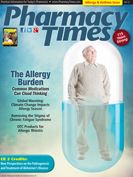Publication
Article
Pharmacy Times
Self-Care for Asthma & Allergy


Mary Barna Bridgeman, PharmD,
BCPS, CGP
Rupal Patel Mansukhani, PharmD
Case 1: Seasonal Allergies
ML is a 36-year-old woman who comes to the pharmacy complaining of itchy eyes and a runny nose. She is 6 weeks pregnant and would like a recommendation for something to treat her runny nose that is safe for the baby. She states that her symptoms usually get worse when she goes outside. The symptoms started at the beginning of spring but she has not been able to go see her primary care physician yet. ML says this is the first time she has ever experienced symptoms like this from being outdoors and has not tried any medications. She is currently taking a prenatal vitamin and is generally healthy. What recommendations would you make to ML?
Answer
ML appears to be experiencing seasonal allergic rhinitis. Normally, ML could try an oral antihistamine, but because she is 6 weeks pregnant, she would meet the criteria for exclusion of self-treatment and should be referred to her primary care physician. Other populations excluded from self-treatment include children younger than 12 years, or patients who have not been diagnosed with allergic rhinitis or have symptoms of infection, undiagnosed or uncontrolled asthma, symptoms unresponsive to treatment, severe side effects of treatment, or moderate-to-severe persistent allergic rhinitis. 1
Allergen avoidance is also important for ML, especially if her symptoms worsen outdoors. ML can be educated to check for pollen counts so she can avoid being outdoors when counts are highest, usually in the morning and evening. She should also be counseled to keep all windows closed in the house and car to keep allergens from coming inside.
Pregnancy risk category B includes medications such as cetirizine, chlorpheniramine, clesmastine, diphendyramine, and loratadine. Intranasal cromolyn, also pregnancy category B, has a wide margin of safety and is considered a first-line option. 2
However, ML should be referred to her primary care physician for a differential diagnosis to confirm allergic rhinitis and for a recommendation for an OTC or prescription medication.
Case 2: Environmental Triggers
FG is a 19-year-old man who comes to the pharmacy asking for a recommendation for his runny nose and occasional itchy eyes. He says that every time he visits his new girlfriend Susan, he starts sneezing and eventually gets a runny nose. His symptoms appear to get worse when he spends more time at her house. His mother told him that when he was younger he was allergic to cats, so he thinks Susan’s cat may be triggering the sneezing and runny nose. He really likes Susan, and he does not want to tell her that he is allergic to cats. Are there any recommendations you can make to FG regarding his symptoms?
Answer
FG appears to be having allergic rhinitis due to cat dander. The best solution for FG is to avoid the cat at all times or to have Susan remove the cat from the household. It is important to educate patients, however, that cat-derived allergens can be found in the house months after a cat is removed. Other ways to decrease symptoms with the cat in the household include changing carpeting to wood floors or tiles, installing an EPA clean air filter, and having nonallergic people clean and care for the pet. FG does not live with Susan, so the best approach would probably be to avoid meeting her in the home. In addition, if FG continues to go over to Susan’s home, drug therapy with a nonsedating antihistamine, such as loratadine, fexofenadine, or cetirizine, could be helpful.
Case 3: Shortness of Breath
TY is a 48-year-old man who comes to the pharmacy in March with a prescription for loratadine 10 mg and montelukast 10 mg. He states his allergies were well controlled for the past 4 months and he did not need his medications. This past week has been horrible, however, and his allergies are “acting up.” TY would also like to purchase a Primatene Mist inhaler. Upon questioning, he says he has been short of breath daily for the past week as well. He says that his allergies usually trigger his asthma, and the Primatene Mist usually helps control his asthma symptoms until he controls his allergies. What recommendation would you make to TY about the management of his asthma?
Answer
TY appears to have allergy-induced asthma. According to the Expert Panel Report 3 (EPR-3): Guidelines for the Diagnosis and Management of Asthma, TY’s asthma severity would be classified as persistent moderate. 3 Primatene Mist is only indicated for mild asthma and was no longer available as of December 31, 2011, as part of a phaseout of epinephrine inhalers containing chlorofluorocarbons. If a patient is still using a Primatene Mist inhaler, they can continue to use it until it expires. However, they should be referred to their primary care physician to discuss other options before their inhaler expirers.
Currently, there are no inhalers available over the counter for self-treatment of asthma. TY should be referred to his primary care physician so he can be prescribed a short-acting beta-agonist to help relieve his shortness of breath until his allergy symptoms are controlled. If TY appears to have daily shortness of breath after his allergies are controlled, additional drug therapy may be necessary to control his asthma.
Case 4: Nondrowsy Relief
BM is a 23-year-old woman who comes to the pharmacy complaining of congestion, runny nose, and itchy eyes for the past week. She says her symptoms have gotten worse over the past few weeks. Her friend recommended she take Benadryl, which appeared to help but makes her extremely sleepy. Although the Benadryl helped with the runny nose and itchy eyes, it did nothing for her headache. Her boyfriend is taking her on a surprise getaway this weekend, so she wants to know what you would recommend for her symptoms. She would like to avoid anything that makes her sleepy. BM is generally healthy and is taking no medications at this time. What would you recommend for her?
Answer
BM does not have any exclusions and appears to be an appropriate candidate for self-treatment. Because BM complains of drowsiness, it would be appropriate to discontinue the use of diphenhydramine and initiate a nonsedating antihistamine. The least sedating antihistamine is loratadine; therefore, she can see if her symptoms improve with loratadine 10 mg daily. In addition, BM may benefit from a decongestant due to her nasal congestion and headache. A combination product such as loratadine/pseudoephedrine may be beneficial for BM.
If her headache persists, she can use acetaminophen 500 mg every 4 to 6 hours as needed. It’s important to educate BM on seeking medical attention if her symptoms worsen or do not improve within 2 to 4 weeks. She should also seek medical attention if she develops signs of an infection, such as a fever, shortness of breath, chest congestion, or wheezing. PT
Dr. Bridgeman is an internal medicine clinical pharmacist in Trenton, New Jersey, and clinical assistant professor, Ernest Mario School of Pharmacy, Rutgers University. Dr. Mansukhani is a clinical pharmacist in South Plainfield, New Jersey, and clinical assistant professor, Ernest Mario School of Pharmacy, Rutgers University.
References
- Disorder related to colds and allergy. In: Krinsky DL, Berardi RR, Ferreri SP, et al (eds). Handbook of Nonprescription Drugs: An Interactive Approach to Self-Care. 17th ed. Washington, DC: American Pharmacists Association; 2011:194.
- Gilbert C, Mazzotta P, Loebstein R, et al. Fetal safety of drugs used in the treatment of allergic rhinitis. Drug Saf. 2005;28:707-719.
- Expert panel report 3 (EPR-3): Guidelines for the diagnosis and management of asthma. Bethesda, Md: National Institutes of Health. www.nhlbi.nih.gov/guidelines/asthma/asthsumm.htm. Accessed March 1, 2012.

Newsletter
Stay informed on drug updates, treatment guidelines, and pharmacy practice trends—subscribe to Pharmacy Times for weekly clinical insights.






